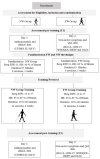Nordic Walking and Free Walking Improve the Quality of Life, Cognitive Function, and Depressive Symptoms in Individuals with Parkinson's Disease: A Randomized Clinical Trial
- PMID: 33467297
- PMCID: PMC7739412
- DOI: 10.3390/jfmk5040082
Nordic Walking and Free Walking Improve the Quality of Life, Cognitive Function, and Depressive Symptoms in Individuals with Parkinson's Disease: A Randomized Clinical Trial
Abstract
Nordic walking's (NW) degree of effectiveness regarding health-related parameters in people with Parkinson's Disease (PD) is a subject of debate. While NW seems to improve functionality, a clear non-motor benefit has not been demonstrated. The aim of this randomized controlled trial was to compare the effects of 9-week NW and free walking (FW) training programs on quality of life, cognitive function, and depressive symptoms in individuals with PD. Thirty-three people with PD, (Hoehn and Yahr 1-4) were randomized into two groups: NW (n = 16) and FW (n = 17). We analyzed quality of life, cognitive function, depressive symptoms, and motor symptoms. Significant improvements were found in the overall, physical, psychological, social participation, and intimacy domains of quality of life, as well as in cognitive function and depressive symptoms for both groups. Only the NW group showed improvement in the autonomy domain. Individuals with PD had a similar enhancement of non-motor symptoms after walking training, with or without poles. However, the NW group showed a more significant improvement in the autonomy domain, strengthening the applied and clinical potential of NW in people with PD. Future studies are needed to determine the efficacy of walking training without poles in subjects with PD.
Keywords: Parkinsonian disorders; cognitive; depression; exercise therapy; neurodegenerative diseases; quality of life.
Conflict of interest statement
The authors declare no conflict of interest.
Figures



References
-
- Frazzitta G., Maestri R., Ghilardi M.F., Riboldazzi G., Perini M., Bertotti G., Boveri N., Buttini S., Lombino F.L., Uccellini D., et al. Intensive rehabilitation increases BDNF serum levels in Parkinsonian patients: A randomized study. Neurorehabilit. Neural Repair. 2014;28:163–168. doi: 10.1177/1545968313508474. - DOI - PubMed
-
- Chan J.S., Liang D., Deng K., Wu J., Cai L., Yan J.H. Broad Impairment of Executive Functions in Patients with Parkinson’s disease: A Meta-Analysis. Rev. Neuropsychiatry. 2018;10:625–643. doi: 10.4172/Neuropsychiatry.1000386. - DOI
Grants and funding
LinkOut - more resources
Full Text Sources
Medical

